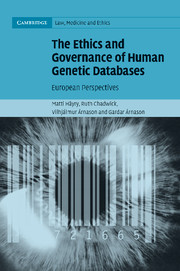Book contents
- Frontmatter
- Contents
- List of contributors
- 1 Introduction: some lessons of ELSAGEN
- Part I Background
- Part II Social concerns
- Part III Legal issues
- 11 Regulating human genetic databases in Europe
- 12 Consent and population genetic databases: a comparative analysis of the law in Iceland, Sweden, Estonia and the UK
- 13 Third parties' interests in population genetic databases: some comparative notes regarding the law in Estonia, Iceland, Sweden and the UK
- 14 Transforming principles of biolaw into national legislation: comparison of four national laws in three aspects
- 15 Governance of population genetic databases: a comparative analysis of legal regulation in Estonia, Iceland, Sweden and the UK
- 16 The legal jigsaw governing population genetic databases: concluding remarks on the ELSAGEN legal findings
- Part IV Ethical questions
- Part V Political considerations
- Part VI Conclusion
- Bibliography
- Index
15 - Governance of population genetic databases: a comparative analysis of legal regulation in Estonia, Iceland, Sweden and the UK
from Part III - Legal issues
Published online by Cambridge University Press: 05 August 2012
- Frontmatter
- Contents
- List of contributors
- 1 Introduction: some lessons of ELSAGEN
- Part I Background
- Part II Social concerns
- Part III Legal issues
- 11 Regulating human genetic databases in Europe
- 12 Consent and population genetic databases: a comparative analysis of the law in Iceland, Sweden, Estonia and the UK
- 13 Third parties' interests in population genetic databases: some comparative notes regarding the law in Estonia, Iceland, Sweden and the UK
- 14 Transforming principles of biolaw into national legislation: comparison of four national laws in three aspects
- 15 Governance of population genetic databases: a comparative analysis of legal regulation in Estonia, Iceland, Sweden and the UK
- 16 The legal jigsaw governing population genetic databases: concluding remarks on the ELSAGEN legal findings
- Part IV Ethical questions
- Part V Political considerations
- Part VI Conclusion
- Bibliography
- Index
Summary
Introduction
A fundamental issue concerning population genetic databases (‘PGDs’) is how they should be governed – in particular, to what extent formal and informal mechanisms of legal regulation can and should be used to control their setting up, operation and management. To date, the law's proper role within the genetic context generally remains ill-defined. The question of governing biobanks through legal or quasi-legal means remains conspicuously under-theorized. Meanwhile, the forms, extent and effectiveness of governance structures vary markedly between jurisdictions. It is illuminating to contrast Estonia, Iceland, Sweden and the UK. These countries demonstrate a range of regulatory models – from the ad hoc, piecemeal, pragmatic UK approach, with its morass of legislative provisions, common law, codes of practice and guidelines, through to the specifically tailored, purpose-designed Estonian legislative code. Comparing salient features from these jurisdictions, in four key areas, highlights potential strengths and weaknesses. Such analysis reveals strong grounds for investigating the feasibility of constructing a uniform, coherent, principled international legal framework to help govern PGDs as a matter of priority.
To some extent, uncertainty over the precise content, relevance and impact of existing laws (particularly in the UK), and disagreement over the preferred methods and ambit of regulation, reflect deeper normative uncertainties. Some commentators doubt whether law is capable of addressing PGD governance issues given its essentially reactive nature, inflexibility and the dynamism of technological advances.
- Type
- Chapter
- Information
- The Ethics and Governance of Human Genetic DatabasesEuropean Perspectives, pp. 132 - 140Publisher: Cambridge University PressPrint publication year: 2007
- 2
- Cited by

